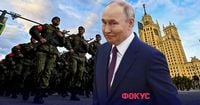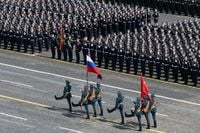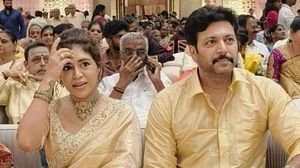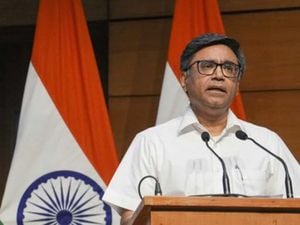As the world watches, Moscow prepares for the Victory Parade on May 9, 2025, marking the 80th anniversary of the end of World War II in Europe. This year, the Kremlin anticipates a significant turnout, with approximately thirty foreign leaders expected to attend the event, which is seen as a crucial moment for Russia amid ongoing geopolitical tensions.
According to Yuri Ushakov, an aide to President Vladimir Putin, the parade will feature leaders from various nations, including notable figures such as Xi Jinping from China and Luiz Inácio Lula da Silva from Brazil. The Kremlin has welcomed these leaders, many of whom have already arrived in Moscow, to commemorate what is traditionally a day of national pride for Russia.
However, the event is not without controversy. The Ukrainian Foreign Ministry has issued a statement urging foreign nations and international organizations to honor the memory of World War II victims while condemning Russian aggression against Ukraine. The Ministry emphasized that the presence of foreign military representatives at the parade would be seen as tacit support for Russia's actions in Ukraine, where Russian forces have been accused of committing numerous war crimes.
“Today, against the Ukrainian people, who are among the victors over Nazism and have paid a heavy price for peace and freedom in Europe, a brutal and unprovoked war of aggression is being waged,” the Ukrainian Foreign Ministry stated. They called on countries to refrain from participating in the parade, particularly those claiming neutrality regarding Russian actions in Ukraine.
The significance of the parade extends beyond mere commemoration; it serves as a platform for Russia to project its power and influence on the global stage. Political analyst Vladimir Fesenko noted that while the attendance of foreign leaders might appear to bolster Putin's standing, it is essential for Ukraine not to overreact to these developments. Fesenko remarked, “We should not make radical decisions regarding these countries. Many leaders attending the parade have been to Russia before and have participated in these events.”
In contrast, the absence of leaders from India and Azerbaijan highlights the complexities surrounding international relations in the context of the parade. Indian Prime Minister Narendra Modi will not attend, likely due to domestic issues following a recent terrorist attack in Kashmir that left 26 dead. Azerbaijan's President Ilham Aliyev also cited internal commitments as the reason for his absence.
Despite the mixed attendance, the Kremlin remains optimistic about the parade's impact. Military contingents from thirteen countries, including Azerbaijan, Vietnam, Belarus, and China, are confirmed to take part in the procession, showcasing military cooperation and solidarity among these nations.
However, the participation of leaders from countries like Brazil, which has been involved in discussions about a peace initiative for Ukraine, poses a challenge for Ukraine's diplomatic efforts. Fesenko indicated that Brazil's relationship with Russia is particularly concerning, as Lula da Silva's visit may symbolize a shift in diplomatic ties. “With Brazil, we have a clear crisis in bilateral relations, and we cannot ignore this,” he stated.
As preparations for the parade continue, security measures in Moscow have been heightened significantly. Streets along the parade route will see the closure of shops and restaurants, and internet services will be suspended throughout the city to ensure the safety of attendees and the smooth conduct of the event.
While the Kremlin seeks to present a united front with its international allies, the implications of the parade extend beyond the borders of Russia. The event serves as a reminder of the ongoing geopolitical tensions and the complex relationships between nations. Fesenko emphasized the need for Ukraine to adopt a flexible foreign policy, stating, “We should cooperate with leaders who have personal contacts with Putin but are also willing to work with Ukraine.”
Political scientist Viktor Nebozhenko added that the actual number of influential guests at the parade may be overstated, suggesting that the presence of leaders like Xi Jinping is more about strategic positioning than genuine support for Russia. “The Red Square cannot accommodate three prominent figures simultaneously; hence, Xi's attendance is a calculated move,” he explained.
In essence, the upcoming Victory Parade in Moscow is not merely a celebration of historical triumph but a reflection of current political dynamics. As foreign leaders gather to pay their respects, the event underscores the ongoing complexities of international relations, particularly in light of Russia's actions in Ukraine.
For Ukraine, the challenge lies in navigating these relationships while asserting its sovereignty and condemning aggression. As the world looks on, the outcomes of this parade may influence diplomatic ties and shape future interactions on the global stage.





